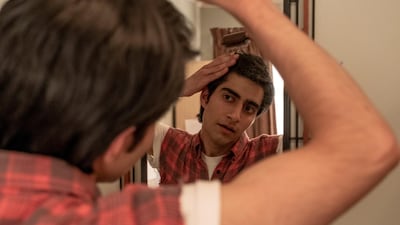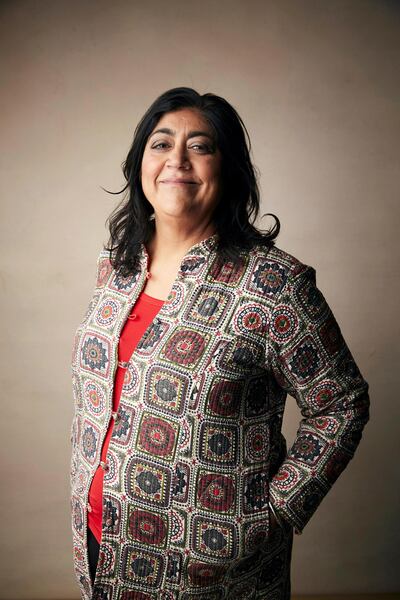More than 17 years after the release of her hit movie Bend It Like Beckham, filmmaker Gurinder Chadha says she continues to be approached by members of Britain's South Asian community who ask her to make the film "over and over again". The story follows a British-Indian girl who can kick a ball like David Beckham, an England international at the time, and reached a global audience, even becoming the only movie made in the West to be screened in North Korea. It's not a bad achievement for a film that almost wasn't made because one of the project's key funders did not think the storyline was realistic.
While Chadha admits that her latest film, Blinded by the Light, a musical about a Pakistani teenager obsessed with Bruce Springsteen, is probably not the kind of movie Bend It Like Beckham fans had in mind, both feature characters who fight to fulfil their dreams against the odds.
Blinded by the Light is an adaptation of British-Pakistani journalist Sarfraz Manzoor's memoir Greetings from Bury Park. The protagonist is Javed, 16, who lives in Luton, a large town north of London portrayed as scarred by racism and unemployment. On a societal level, Javed, his family, his Asian friends and Asian family friends all have to deal with the physical and emotional violence of racism on a regular basis and are subject to the message that they don't belong in Britain.
On a family level, this is reinforced by Javed's father, who tells him they are Pakistani and will never be accepted. Navigating both of these worlds affects Javed's spirit and he despairs that he will be unable to fulfil his dreams, but after being introduced to Bruce Springsteen's music by a boy at college, Javed's life changes. He finds a sense of purpose and connection with the American musician's lyrics, becomes more confident and is inspired to pursue his passion for writing.
Inspired by The Boss
Chadha says her love for Springsteen was one of the key reasons she wanted to turn Manzoor's story into a film. She has been a huge fan of the rock star since being introduced to his music by a colleague at Harrods when she worked there part-time and was a soul music fan, but was struck by the interracial dimension of 1975's Born to Run album cover, which features Springsteen and saxophonist Clarence Clemons.
After listening to the album, she fell in love with Springsteen's lyrics "because he writes about everyone being the same. His philosophy is no one wins, unless we all win".
"When I first heard it, I felt he was writing about people like my parents – people who struggle to make a living, people facing undue hardship, people in the margins – hard-working, working-class people," Chadha says. "I think there's a dignity in that, and that's what I'm trying to capture in the film."
It was a mutual love of Springsteen that drew her to Manzoor. After she read a newspaper article he wrote about The Boss, as Springsteen is nicknamed, Chadha got in touch with Manzoor and they became friends. When he said he was writing a memoir, she told him she believed she could turn it into a film, but would first need "Bruce's blessing".
The opportunity to ask for that came when Springsteen visited the UK for the premiere of 2010's The Promise: The Making of Darkness on the Edge of Town, a documentary about his fourth studio album. Chadha attended the event with Manzoor. When Springsteen approached to praise the journalist's memoir, Chadha seized her chance. She laughingly recalls telling herself to be "calm and professional", only to end up sounding hysterical when she spoke to the rocker about making a movie. The musician told her to speak to his team and the rest, as they say, is history.
A story about a British-Pakistani boy obsessed with Springsteen is a far cry from the standard tropes of Pakistani men in a society with a history of marginalising its minorities. A hallmark of Chadha's work is the way she subverts stereotypes, but she admits she learnt the hard way that representation matters after she made a short film, 1992's A Nice Arrangement, about an Indian Hindu woman who is in love with a Muslim, but faces an arranged marriage to another man.
"That was a good lesson for me because I understood the power of image," she says. "The image of that Indian woman not being able to marry who she wants fed into all the arranged marriage stereotypes. I realised I had to be clever with representation to avoid making that mistake again."
Since then she has made movies with non-conventional characters and storylines, including Bhaji on the Beach (1993), Bride and Prejudice (2004) and Angus, Thongs and Perfect Snogging (2008). Blinded by the Light tells the story of a Muslim teenager in a world where Islamophobia is rife, and Chadha says she felt a responsibility to tell that story in the right way.
"But even more than that was not messing up Bruce's words. Bruce gave us his entire catalogue. I was like, 'Oh my god, what are all these Bruce fans going to say when I've got Muslim kids running around Luton singing Born to Run?'"
Why the film will still speak to audiences today
While the film is set in the 1980s, Chadha says it will resonate with audiences of today. "It's bigger than the Muslim kid. It's bigger than Bruce," she says. "It's about what's going on in our world right now, and how to make those words and that life relevant, even though the film is set in 1987.
I put a lot of my pain and fear about what happened in England with Brexit and all the xenophobia that happened afterwards into the film, which is why I feel it’s so relevant to what’s going on in the world now.”
While the film can be read as a political commentary on British society, it strives to portray a balanced narrative. On one hand there are far-right National Front thugs who beat up Javed's dad and racist bullies who try to intimidate the teenager and his friend Roops, but there are also characters such as Javed's English teacher, who helps him cultivate his writing and pushes him to pursue his dream of being a writer. Javed's girlfriend also sensitively navigates cultural differences and unabashedly takes on her parent's bigotry, while his caring neighbour supports his writing.
"I had neighbours like that growing up, very kind English neighbours," Chadha says. "I thought it was important to show that as well."


